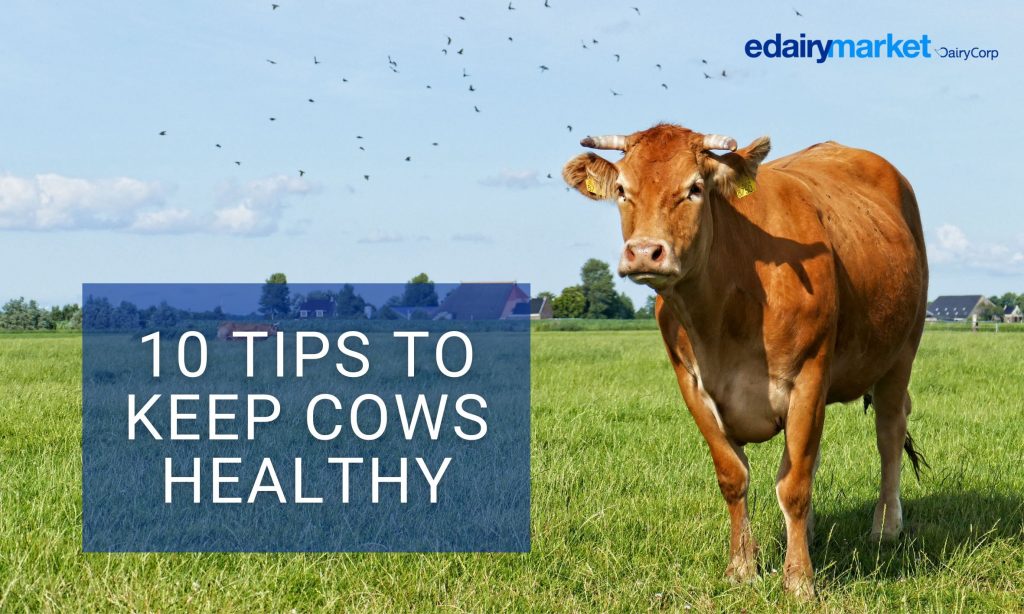
Today eDairy Market shows you here some tips to give a good life to your cows to improve their welfare and productivity:
1. Make her exercise:

Cows need enough space to move freely, so make sure they have enough room to graze and roam.
2. Provide good quality feed and water:

Make sure that cows have access to fresh, clean water and a balanced diet that meets their nutritional needs.
3. Keep them clean and dry:

Cows must be kept clean and dry to avoid health problems such as infections and hoof rot. Provide them with a clean, dry shelter where they can rest and shelter from inclement weather.
4. Monitor their health:

Regularly examine cows for any signs of illness or injury, and give them the necessary medical attention as soon as possible.
5. Provide adequate space:

Cows need exercise to maintain good health and prevent obesity. Encourage them to move around by providing adequate space.
6. Provide a comfortable environment:

Make sure the environment is comfortable for cows by providing clean, dry, well-ventilated shelter. Temperature should also be regulated to avoid heat or cold stress.
7. Minimize stress:

Avoid any activities that may cause stress to cows, such as rough handling, crowding and loud noises.
8. Respect their natural behavior:

Cows are social animals and need to interact with other cows. Allow them to graze and interact with other cows to help them maintain their natural behavior.
9. Regularly clean their living space:

Regularly clean and disinfect the cows’ living space to minimize the risk of disease and infection.
10. Treat them kindly:

Treat cows with kindness and respect, as they are sentient beings capable of experiencing pain, fear and stress.
What kind of exercise can be given to cows?
Regarding the exercises that can be given to farm cows to prevent them from gaining weight and keep them healthy, it is, for example, to give them space to move freely around the pasture. By nature, they like to walk and roam, so it is important to give them enough space to do so. It can also be beneficial to encourage them to move around by providing them with toys or objects to play with.
One way to encourage exercise is to use a rotational grazing system in which cows are periodically moved to a new grazing area. This allows them to get exercise when they move to a new location and also helps prevent overgrazing.
Another way to encourage exercise is to create an obstacle course or play area for the cows. This can include items such as large balls, tires or logs for the cows to push or jump over.
In addition, some farmers use brushes or scrapers that allow cows to rub and scratch against them, providing exercise and stimulation.
It is important to keep in mind that cows should be able to exercise at their own pace and not be forced into strenuous or unnatural activities that may cause stress or injury.
What about feeding?
Cows have feeding preferences, and these can vary depending on their age, breed and individual preferences. Here are some common cow preferences:
Fresh grass: Cows are natural herbivores and prefer fresh grass, especially during the growing season. They prefer young, tender grass to mature, tough grass.
Hay: Cows also like hay, especially if it is of high quality and free of mold and dust.
Silage: Silage is a fermented feed made from crops such as corn, grass or alfalfa. Cows prefer silage made from high-quality, properly fermented crops.
Grains: Cows also like cereals, such as corn, wheat and barley, which can be fed as a supplement to their regular diet. However, they should be fed in moderation and balanced with other nutrients to avoid health problems.
Treats: Some farmers give cows treats such as apples, carrots or bread. However, they should be given in moderation to avoid weight gain and health problems.
It is important to keep in mind that cows have specific nutritional needs and their diet must be balanced to meet these needs. Feeding cows a balanced diet that meets their nutritional needs is key to keeping them healthy and productive.
Keeping farm cows healthy is important for several reasons:
Animal welfare: As sentient beings, cows are entitled to a healthy and pain-free life. It is the responsibility of farmers to ensure that their cows are well cared for and do not suffer.
Productivity: Healthy cows are more productive and can produce more milk, meat and other dairy products. By keeping cows healthy, farmers can maximize their production and profits.
Economic impact: Cow health can have a significant impact on the economy, especially in the agricultural sector. Disease outbreaks can cause economic losses to farmers and the industry as a whole.
Food safety: Healthy cows are less likely to transmit diseases to humans, which is important for food safety. By keeping cows healthy, farmers can help ensure that the food they produce is safe for consumption.
Environmental impact: Healthy cows produce less waste and are less likely to cause environmental problems. By keeping cows healthy, farmers can reduce their environmental impact and promote sustainable agriculture.
Overall, keeping farm cows healthy is important for animal welfare, industry productivity and food supply security.
Do you have any advice that we have not mentioned?
✅ At eDairy Market we have all the dairy categories, all the products and all the companies. We represent you.
✅ Power your business through eDairy Market:
- Your microsite with products, brand and domain of your company at a minimum cost.
- You will be able to sell your products and we do not charge you commission per sale.
- Now you can sell your Products, Ingredients and Dairy Machinery in English, Spanish, Portuguese and Mandarin Chinese.
✅ Create your own online store in a super easy way:























